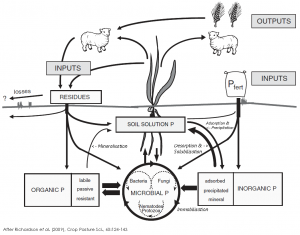
Article
Microbes Integral to Soil P Cycle
Summarised by Dr Ash Martin PhD BSc(For)Hons
Microbes are integral to the soil phosphorus (P) cycle and as such play an important role in making P available to plants. This importance is accentuated by the P deficiency of many soils throughout the world, by rising costs of P fertiliser, and because the efficiency of P use by plants from soil and fertiliser sources is often poor, despite many soils containing a relatively large amount of total P that is only sparingly available to plants. Using microbes to increase the availability of P in soil is therefore an attractive proposition, and is not a new concept. Gerretsen (1948) showed that pure cultures of soil bacteria increased the P nutrition of plants through solubilisation of calcium phosphates. Since this study, many examples of P mobilisation by microbes have been reported. Plants take up P as phosphate via high-affinity transporters in their roots, expressed in response to P deficiency and through interaction with mycorrhizal fungi. This article summarises the current evidence on the role of microbes in increasing the availability of P to plants and opportunities for enhancing P mobilisation are discussed.
Click here for more information about P Wise
Read the in-depth article:
Richardson & Simpson (2011). Soil microorganisms mediating phosphorus availability. Plant Physiology. 156: 989–996. (Requires PDF viewer)


